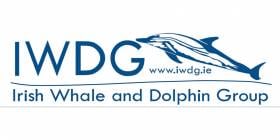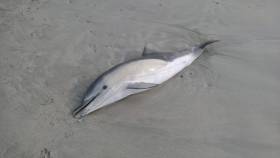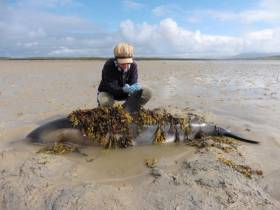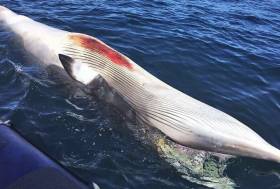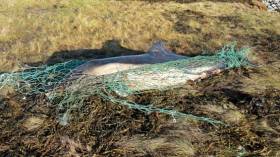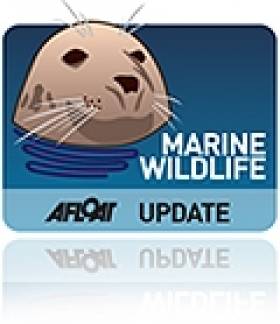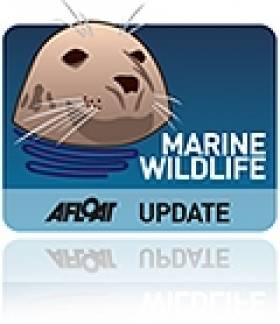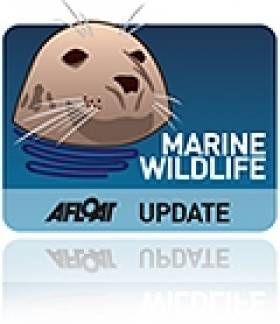Displaying items by tag: Strandings
IWDG Records Spate of Dolphin & Whale Strandings Around Irish Coast
The Irish Whale and Dolphin Group (IWDG) has appealed for the public to keep a look-out after a spate of marine wildlife strandings reported in recent days.
Half of the six reports were live strandings, the group says, but only one animal was successfully returned to the water.
In Galway, a common dolphin live stranded with serious injuries but died shortly after IWDG members arrived at the scene.
Another common dolphin live stranded at Mulranny in Co Mayo. Local woman Catherine Hanley, who reported the stranding, managed to refloat this dolphin with her group and it has not been seen since.
In Co Donegal, a “very emaciated” Cuvier’s beaked whale live stranded at Dooey Beach in Downings, on the Rosguill peninsula, but died shortly after.
 An emaciated Cuvier’s beaked whale live stranded on Dooey Beach in Downings. The deep-ocean species has a significant population near Irish waters but is rarely sighted
An emaciated Cuvier’s beaked whale live stranded on Dooey Beach in Downings. The deep-ocean species has a significant population near Irish waters but is rarely sighted
Elsewhere, the remains of three more cetaceans were reported around the coast in recent days.
In Rathmullen, Co Donegal, the carcass of a common dolphin appears to match video of a dolphin swimming in the area the previous day, suggesting a live stranding.
At Greenore in Co Louth, at the mouth of Carlingford Lough, a common dolphin in “very fresh condition” was reported to the local IWDG group.
And in Passage East, Co Waterford, a carcass in “very poor” condition has been logged as “dolphin species” as its advanced state of composition made further identification impossible.
The IWDG appeals for the public to report all strandings “so we respond immediately and monitor the status of our whales and dolphins”.
UK’s Natural History Museum Releases Decades Of 20th Century Whale & Dolphin Stranding Records
#MarineWildlife - The UK’s Natural History Museum has made available for the first time a vast trove of whale and dolphin stranding records in British and Irish waters.
The data covers the years 1913 to 1989, filling in a significant gap before the Irish Whale and Dolphin Group’s stranding scheme began in 1991.
Over the years many entries were submitted by the coastguard, fishermen and members of the public — including a detailed record of a harbour porpoise found in Co Cork in 1913, the very first card in the data set.
PhD candidate Ellen Coombs is combing through the records to determine what picture “one of the longest systematic cetacean stranding data sets in the world” reveals for the status of cetacean species in our waters.
And already there have been some important finds, such as occasional records of deep-diving Cuvier’s beaked whales over the decades — not to mention a double stranding of narwhals in 1949.
The data also correlates with already known trends, such as the sharp decline in blue whale records with the expansion of commercial whaling in the early 20th century.
The Natural History Museum website has more on the story HERE.
Whale & Dolphin Strandings In Cork This Week ‘Only A Percentage Of What Is Actually Dead At Sea’
#MarineWildlife - Unusual weather for this time of year may be responsible for a recent spate of whale and dolphin strandings on the Cork coast in the past week.
The Irish Examiner reports that among the eight strandings were the carcass of a sperm whale on Long Strand in West Cork and a dolphin with fishing line around its beak in Schull.
However, the Irish Whale and Dolphin Group’s (IWDG) Mick O’Connell said that while the statistic was high within such a short timeframe, it was not necessarily a mystery.
“We normally get the same thing every year,” said the IWDG stranding officer. “It is usually more in the southwest and west, but this year, I suppose we have had more southeast winds, which probably explains it.”
O’Connell added that the strandings are “only a percentage of what is actually dead at sea” — and that post-mortems may “shed some light in their deaths”.
The Irish Examiner has more on the story HERE.
IWDG Marks Another ‘Record’ Year For Cetacean Strandings
#MarineWildlife - The Irish Whale and Dolphin Group (IWDG) has expressed its dismay at another record year for cetacean standings around the Irish coast.
The first eight months of 2017 alone have seen 201 recorded strandings - up 30% compared to the same period in the last two years.
“As in recent years, the numbers of dead common dolphins recorded are very high, with 78 records for this species to the end of August 2017 accounting for 39% of all strandings,” says IWDG strandings officer Mick O’Connell, who notes that the numbers of dead dolphins washing ashore in late winter and spring has grown unusually high.
“Even in a series of years with particularly high numbers of this species stranding since 2011, 2017 is well ahead of the previous two ‘record’ years by the end of August — 66 in 2016 and 53 in 2013.
“These are, of course, minimum numbers as we don't know how many dead animals go unrecorded and also many unidentified dolphins which aren't identifiable to species level are likely to be common dolphins,” he adds.
The IWDG is currently working with the Marine Institute, Department of Agriculture and National Parks and Wildlife service on a post-mortem scheme for common dolphins, striped dolphins and harbour porpoises which is hoped will shed new light on what might be causing this alarming rise in cetacean deaths.
Meanwhile, there was more positive news from the recent all-Ireland whale watch at the end of August, where three-quarters of the 20 sites around the island recorded sightings.
Around 1,300 whale watchers and wildlife enthusiasts spotted eight species of cetacean between them — with the busiest site at Loop Head in Co Kerry, where 120 lucky visitors got to see two humpback whales, five minke whales, six bottlenose and a whopping 50 common dolphins.
Other marine wildlife species spotted around the coast included Risso’s dolphins, blue fin tuna, ocean sunfish and grey seals.
More recently, the IWDG’s Celtic Mist embarked on a week-long survey of the waters around North and West Kerry, and its crew shared a video of some of their sightings.
#MarineWildlife - The Irish Whale and Dolphin Group (IWDG) has reiterated the need for localised stranding plans after the death of two common dolphins that stranded in Mayo's Blacksod Bay in late July.
Aoife Foley of the IWDG writes that the two dolphins were part of a pod of five that were spotted close to the shore at Mullaghroe Beach on Saturday 23 July.
A team from the Broadhaven Bay Marine Mammal Monitoring Programme joined local marine biologist Machiel Oudejans to move the dolphins, which did not appear to be injured or in obviously poor health, back into deeper waters and out to sea.
However, the following afternoon a member of the programme team saw that two of the marine mammals had stranded on the same stretch of beach, which Foley says is "notorious for common dolphin strandings in Blacksod Bay".
Despite best efforts, by Tuesday 26 July one of the animals had died and the other had to be put down by the National Parks and Wildlife Service.
The IWDG has more on the story HERE.
Minke Whale Deaths Cause For Concern In Kerry
#MarineWildlife - A number of dead minke whales found off the Dingle Peninsula in recent months have puzzled locals and experts alike, as TheJournal.ie reports.
The carcasses of three juvenile minkes have been spotted in the region since April, comprising 25% of all Irish minke whale standings since records began in 2000.
A fourth whale carcass was found on the shore at Killough in Co Down last week, according to BBC News.
But no one seems to know the reasons for these marine wildlife deaths, with the lack of a post-mortem scheme for whale strandings making matters even cloudier.
Mick O’Connell, strandings co-ordinator of the Irish Whale and Dolphin Group (IWDG), believes the phenomenon is localised to the Dingle Bay area.
Yet while the species is a regular visitor to the Blasket Islands and environs, O'Connell says it's "very unusual to have so many dead ones in the one small area, in the space of 10 or 12 weeks."
The same region also saw a number of unsubstantiated dolphin deaths in recent weeks, which one fishery expert suggested might be connected with the presence of so-called 'supertrawlers' fishing in the area.
Similar concerns were raised earlier in the year when a spike in common dolphin standings, primarily in the North West – totalling 28 for January and February alone – coincided with reports of supertrawler activity off the Dongeal, Sligo and Mayo coasts.
#MarineWildlife - Strandings of common dolphins for the first two months of the year are at their second highest since records began in 2002, says the Irish Whale and Dolphin Group (IWDG).
A total of 28 confirmed standings were recorded in the IWDG's strandings database in January and February of this year, just below 2013's worst figures so far when 31 were reported.
That compares to an average of fewer than six reports for the same period each year between 2002 and 2010.
The current decade has seen a significant jump in recorded figures, with 18 reports of dolphin standings in 2011 compared to just two in the same months in 2010.
Many of the dolphins found this year were recorded in the North West, a great number of them drowned according to post-mortem results, while others showed signs of being tangled in fishing gear, which suggests they were bycatch in the nets of supertrawlers that ply the seas off Donegal, Sligo and Mayo.
"While there is no conclusive proof of what vessels are involved, the evidence points to the presence of large (c.100m) foreign registered freezer trawlers fishing in Irish offshore waters."
That's according to the IWDG's strandings officer Mick O'Connell, who warns that "the number of bycaught dolphins that actually get washed ashore and recorded as stranded may be only a small percentage of the actual number of dead animals."
The IWDG reiterates the call for independent observers to be placed on supertrawlers in Irish waters, following controversy over the visit of one of the world's largest fishing boats last November.
In other news, Scotland's Press and Journal reports that a humpback whale was killed after getting trapped in fishing ropes in the Outer Hebrides.
The juvenile whale was found dead on the Isle of Barra this week with the "classic signs of having suffered entanglement."
#dolphinstrandings – As Afloat.ie reported earlier, a County Mayo woman Ina Kruger successfully rescued a stranded dolphin at Easter on Keem beach, Achill. Originally rescued on Easter Sunday, the dolphin returned to the beach where the body of a second dolphin was discovered. Fortunately, the second rescue attempt was more successful and the dolphin hasn't been seen since.
Whale and Dolphin Strandings Reach 'Record High' Says IWDG
#MarineWildlife - The Irish Whale and Dolphin Group (IWDG) has expressed its dismay at the continued rise in whale, dolphin and porpoise strandings around Ireland in 2013.
"The question was whether the numbers for 2012 were just a temporary ‘blip’ in the trend and would the figures for Ireland return to a more ‘normal’ 145 or so for 2013," writes IWDG strandings officer Mick O'Connell on the group's website.
"Well, as we head towards the start of winter, we can see that the answer is a most definite ‘no’."
O'Connell explains that by the end of the first week of October this year, the group had received validated reports for 175 cetacean stranding incidents - matching the total for the 12 months of 2012.
"With a good few weeks left until the years end, it’s likely that for the first time ever, the strandings database will receive 200-plus cetacean stranding records," he writes, adding that there is as yet "no explanation as to the cause or causes for the significant increase in figures" - though it's so far clear that the biggest increase is among common dolphins.
New Research Says Sonar Sends Whales Scurrying
#MarineWildlife - The Guardian reports on new research which proves that military sonar has a direct effect on the behaviour of whales in our oceans - even leading to mass strandings.
The studies, part funded by the US Navy, found that beaked whales where particularly sensitive to sonar - and that even blue whales, the largest animals on earth, were distracted from feeding by the subsurface noise.
It's long been feared that the use of sonar is to blame for unusual behaviour among whales, who navigate and communicate with each other over long distances using sound.
As previously reported on Afloat.ie, the Irish Whale and Dolphin Group (IWDG) identified sonar activity by Royal Navy submarines as a possible cause of a the mass stranding of pilot whales in Donegal in November 2010, in which as many as 35 whales died.
Now for the first time, sonar has been proven to affect behaviour of cetaceans to a detrimental degree, confirming for many a connection between the use of sonar technology and recordings of whale and dolphin strandings identified since the 1950s. The Guardian has much more on the story HERE.
In more positive whale-related news, the IWDG reports that its next Cape Clear summer whalewatching course over the weekend of 26-28 July is "filling up nicely".
Places are still available but as it coincides with the tourism high season in West Cork, anyone interested is advised to book sooner than later to ensure they have someone to stay nearby.
The most recent weekend course over the June bank holiday witnessed numerous harbour porpoises and common dolphins, but its hoped the elusive whales will make an appearance next time round!




























